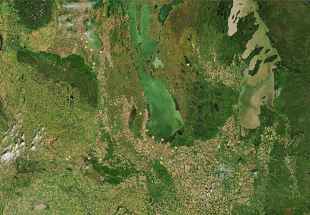Majority of Manitobans worry about impact of climate change: poll
Read this article for free:
or
Already have an account? Log in here »
To continue reading, please subscribe:
Monthly Digital Subscription
$0 for the first 4 weeks*
- Enjoy unlimited reading on winnipegfreepress.com
- Read the E-Edition, our digital replica newspaper
- Access News Break, our award-winning app
- Play interactive puzzles
*No charge for 4 weeks then price increases to the regular rate of $19.00 plus GST every four weeks. Offer available to new and qualified returning subscribers only. Cancel any time.
Monthly Digital Subscription
$4.75/week*
- Enjoy unlimited reading on winnipegfreepress.com
- Read the E-Edition, our digital replica newspaper
- Access News Break, our award-winning app
- Play interactive puzzles
*Billed as $19 plus GST every four weeks. Cancel any time.
To continue reading, please subscribe:
Add Free Press access to your Brandon Sun subscription for only an additional
$1 for the first 4 weeks*
*Your next subscription payment will increase by $1.00 and you will be charged $16.99 plus GST for four weeks. After four weeks, your payment will increase to $23.99 plus GST every four weeks.
Read unlimited articles for free today:
or
Already have an account? Log in here »
Hey there, time traveller!
This article was published 21/02/2020 (2122 days ago), so information in it may no longer be current.
Nearly three-quarters of Manitobans worry about how climate change will impact the province, a new poll suggests.
The survey, conducted by Canadian analytics firm Leger, in partnership with the Winnipeg Free Press, found 72 per cent of the 800 respondents answered they were either “somewhat worried” or “very worried” about how climate change would affect them and their families.
Questions
Climate change and its effects in Canada and around the world are often talked about in the media and by political leaders. When you hear news and discussion about climate change, how worried are you about how this will impact you and your family here in Manitoba?
There is a lot of discussion these days about climate change and global warming. Which view is closest to your own: mankind’s actions are greatly contributing to climate change; the changing climate is part of earth’s historic natural cyclical process; or don’t know.
Methodology
A total of 800 online surveys were conducted in Manitoba between Feb. 7 and 17. The two questions on climate change were also included on Leger’s weekly national omnibus poll, which consisted of 1,500 surveys (1,444 interviews excluding Manitoba).
As a non-random internet survey, a margin of error is not reported. If the data were collected through a random sample, the margin of error would be plus- or minus-3.5 per cent, 19 times out of 20 in Manitoba, and plus- or minus-2.5 per cent, 19 times out of 20 in Canada.
That put Manitobans slightly ahead of the rest of Canada, with the poll finding country-wide, 68 per cent of respondents answered they were worried about feeling local impacts of climate change.
“I was a bit surprised that Manitoba is in sync with the rest of the country,” said Leger executive vice-president Andrew Enns.
The polling also showed one in four Manitobans believe the warming of the planet is caused by natural cyclical processes — which is counter to scientific consensus on the issue.
Respondents were more likely to answer, “Mankind’s actions are greatly contributing to climate change,” if they were younger, had an income above $125,000 annually, or lived in Winnipeg, versus respondents from outside the capital city.
“There’s a generation coming up that’s much more attuned and attached to this issue,” Enns said.
Research monitoring public opinion about climate change is also regularly conducted by the University of Montreal, in concert with the Yale Program on Climate Change Communication. Erick Lachapelle, associate professor of environmental politics and public opinion, says the results from Leger follow roughly the same trends he’s seen.
“We used to think that climate change was very abstract, distant in terms of the consequences. But our research has shown — and this new research that you’re pointing to now — is consistent with the idea that increasingly Canadians see climate change in their own backyard,” Lachapelle said.
This is an attitude Canadians have already seen play out in politics at the federal level, Lachapelle added, pointing to the fact most Canadians voted last fall for a federal party with a strong climate platform.
But the change in public opinion has been swift. In 2014, the number of Canadians who viewed climate change as a current problem was under the 40 per cent threshold, Lachapelle said. After record-breaking wildfires, and several years of weather extremes, that number jumped to 55 per cent in 2017.
“These are double-digit increases. These are rarely seen in public opinion polling. Usually, I’m skeptical when I see such large shifts, but ever since 2017 — in 2018 and 2019 — we found the (same) numbers. It seems there’s a plateau now, but nevertheless, there’s a majority of Canadians that believe that the impacts are happening already, here and now.”

!function(e,i,n,s){var t=”InfogramEmbeds”,d=e.getElementsByTagName(“script”)[0];if(window[t]&&window[t].initialized)window[t].process&&window[t].process();else if(!e.getElementById(n)){var o=e.createElement(“script”);o.async=1,o.id=n,o.src=”https://e.infogram.com/js/dist/embed-loader-min.js”,d.parentNode.insertBefore(o,d)}}(document,0,”infogram-async”);
When broken down by province, Lachapelle’s research show Manitoba (57 per cent) is 10 percentage points ahead of western neighbour Saskatchewan when it comes down to a question of whether or not climate change is happening as a result of human activity. Alberta brings up the tail end of the pack on the Prairies — but even there, 42 per cent agree to that statement.
Melanee Thomas, associate professor of political science at the University of Calgary, is researching what these attitude shifts on climate change mean for perspectives on energy transition towards more renewable resources over conventional fossil fuels.
“The more worried people are about climate change, the more likely they are to want to see a transition to more renewable sources of energy, than folks who are not worried. So people can believe in climate change but if they’re not worried about it, they’re less enthusiastic about energy transition,” Thomas said.
But over the years, the public opinion polling Thomas has examined has shown her Canadians aren’t as divided on these policy issues as it sometimes feels. Canadians actually agree on most things, Thomas said.
“So one of the things I think is going on, is that it’s actually not about the policy content or public opinion content, it’s much more about perceptions of identity. Manitoba is an interesting province because they clearly can’t be grouped with Alberta and Saskatchewan… but when we’re looking for where the breakdowns and divisions are, it’s much more about identity and the group that you belong to.”
In the end, Thomas said, these shifts towards one another on policy issues might not mean unity at the ballot box.
“(People) can be worried about climate change, and support certain kinds of energy policy but what might trump that would be their partisanship.”
sarah.lawrynuik@freepress.mb.ca







